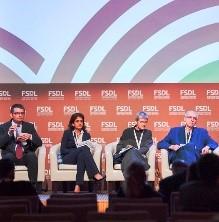Dialogue Series, Environmental Studies, Panels, Regional Studies
Causes and Consequences of Food Insecurity in the Middle East

In collaboration with partner organizations, Qatar’s National Food Security Program hosted the “International Conference on Food Security in Dry Lands” in Doha on November 14th and 15th, 2012. National, regional, and international institutions participated in the conference and addressed challenges facing dry lands in their pursuit of food security. The conference focused on the three thematic areas of: (i) food security; (ii) water demand, resources, and management; and (iii) responsible investment. As part of the focus on food security, the Center for International and Regional Studies led a panel discussion titled “Causes and Consequences of Food Insecurity in the Middle East” moderated by Zahra Babar, Assistant Director of research at CIRS and co-editor of the forthcoming CIRS book Food Security and Food Sovereignty in the Middle East (Oxford University Press/Hurst, 2014). The panel consisted of three panelists who presented three country case studies that addressed economic, social, and political causes of food insecurity in Egypt, Yemen, and Lebanon.
Raymond Bush, a professor of African Studies and Development Politics at the University of Leeds, presented on food security in Egypt. Although Egypt boasts vast areas of arable land, as well as a high level of agricultural skill and know-how, it faces the problem of insufficient food production. By exploring the Egyptian agricultural strategy since the onset of economic liberalization in the 1980s, Bush highlighted that Egypt’s inability to defend its food security is due to the exclusion of farmers and food producers from the political debates that set agricultural strategies. Reflective of the governing regime, agricultural modernization strategies in Egypt have been authoritarian in nature with limited outreach and sustainability. In the context of the Arab Spring, the increased Egyptian enthusiasm for political pluralism and rural empowerment may lead to the co-operative inclusion of farmers in the agricultural policy debate and the eventual improvement of Egypt’s food security situation.
The second panelist, Martha Mundy, talked about the impact of food and agriculture policies on property relations and the ecological base of food production in Yemen. A reader in Anthropology at the London School of Economics and a specialist in the anthropology of the Arab World, Mundy argued that these policies were largely influenced by oil rent and oil-derived political rent while significantly disregarding the Yemeni biosphere. As the international community plays an increasingly more active role in guiding Yemen towards a food-secure future, Mundy emphasized the need to have a holistic approach that prioritizes farming skills conducive to environmental conservation. The case of Yemen depicts that policies surrounding food aid need to move beyond the sanctification of the “rules of the market,” which have led to environmental degradation, farmers’ loss of capacity to produce food, and exclusion of farmers from the agro-based revenue accumulated by the oligarchical state.
Presenting the case of food security in Lebanon was Jad Chaaban, assistant professor of Economics at the American University of Beirut. As a small-import dependent country, Lebanon faces high risks of price volatility that negatively affect its ability to meet its food and beverage consumption needs. The accessibility and profitability of agricultural produce is further hindered by the oligopolistic concentration of supply chain inputs and food trade monopolies. In order to overcome these food security challenges, Chaaban recommended the need for a national integrated cross-sectoral food policy that takes into consideration the presence of long-term residences such as refugees, recognizes farmers as legal units, enhances competition amongst farmers, and supports local food production.
In addition to their respective case studies, the panelists discussed additional causes of food insecurity such as food-waste and post-harvest handing as well as irresponsible agricultural investment. The panelists emphasized that agricultural investments need to be socially conscious and not just based on profit. These investments have repercussions beyond the land rented and crop produced. The fact that those who produce food are generally the most food insecure indicates that equity driven agricultural production has dire consequences on farmer families and environmental preservation.
Article by Dwaa Osman, Research Analyst at CIRS